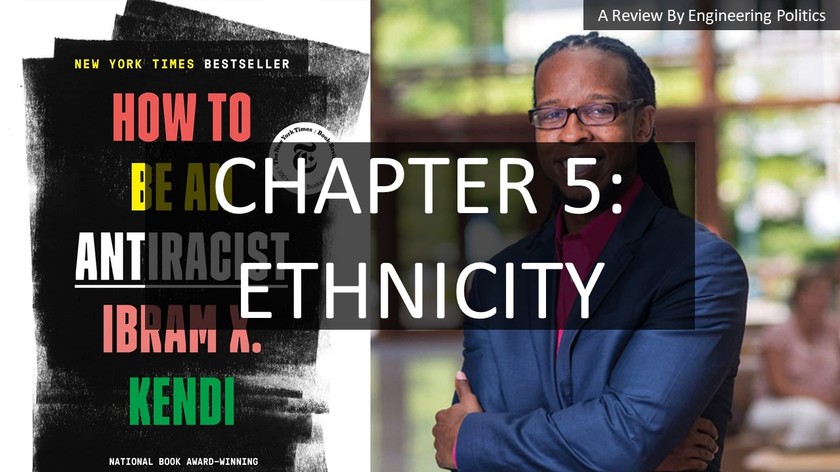
This chapter is titled ethnicity, but it really should be titled intellectual dishonesty. Kendi repetitively uses bad motives to justify different injustices. We could say this has been a common theme throughout the book, but this chapter seems to highlight that theme more than others, especially since it doesn’t really add much value to his general thesis on its own. Kendi starts out the chapter by defining Ethnic Racism and Ethnic Antiracism.
“ETHNIC RACISM: A powerful collection of racist policies that lead to inequity between racialized ethnic groups and are substantiated by racist ideas about racialized ethnic groups.
ENTHIC ANTIRACISM: A powerful collection of antiracist policies that lead to equity between racialized ethnic groups and are substantiated by antiracist ideas about racialized ethnic groups.”
As we can see above, and if you read my review for chapter 1, there really is not difference between the pair of terms ethnic racism and ethnic antiracism and the more generalized pair racism and antiracism. Kendi adds in the ethnic aspect as a way to show the damaging effects of race generalizing people of different origins who look the same. Now, if Kendi wants to make it a point that categorizing people by skin color might be more harmful that categorizing people by ethnicity and country of origin, I’ll get behind that, but for a guy who often talks about his blackness, I don’t think he’s being sincere about that stance. Honestly, this chapter doesn’t really seem to add much more value to his general thesis, other than giving more anecdotes on his personal experience with race as a child, but seems like his is just trying to extend his book by another chapter.
Kendi goes on to talk about his experience as a young kid while the O.J. Simpson trail took place. Kendi is very open about his views on the verdict. “I wanted O.J. to run free.” He uses past and present injustices to justify a verdict he openly admits he knows is wrong. Because remember folks, “the only remedy to past discrimination is present discrimination.”
Kendi then goes into more analysis on the slave trade and continues his theme of intellectual dishonesty. He highlights the “idea that ‘African chiefs’ sold their ‘own people’… overlaying our present ideas about race onto an ethnic past.”
“Africans involved in the slave trade did not believe they were selling their own people – they were usually selling people as different to them as the Europeans waiting on the coast.”
It is hard to imagine Kendi is using this defense as a way to place sole blame on the Europeans for slavery and absolve all sins for the Africans who had a critical role in capturing and selling the slaves to the Europeans, but it’s hard to read this any other way than that. If I’m understanding his argument correctly, we should not condemn all Africans for the immoral actions of a few. Well, that logic is correct, and completely destroys the most critical aspect of the white privilege idea that forces all white people to apologize for slavery. But Kendi persists.
“The racializing serves the core mandate of race: to create hierarchies of value.”
“Ethnic racism, like racism itself, points to group behavior, instead of policies, as the cause of disparities between groups.”
Per our usual arrangement, Kendi evokes some ominous hierarchy of power based on race to make his point. Although this may have been true in the past, and is presently true for some, I don’t think there is any evidence it is relevant today unless, of course, we use disparities to prove a reverse relationship to race hierarchies. Kendi’s worship for the almighty policy is a good test to see how someone views human behavior. If we could just implement the right policies, we could permanently change human behavior… said every dictator ever. This reminds me of the lessons I learned from Thomas Sowell’s books A Conflict of Visions and The Vision of the Anointed. Basically, there are people who hold an unconstrained vision of human behavior where we can completely change human behavior through sheer will and proper government policy, and then there’s the constrained vision of human behavior where we can’t change human behavior through means other than organic cultural change or evolution. Kendi clearly views human behavior through the lens of the unconstrained vision, and therefore, believes there is a perfect set of policies that will result in perfect equity.
Kendi continues talking about African American economic disparities compared to first generation immigrants from Africa but marked that down to immigrant self-section where only the most motivated immigrants come to America. This is true for all immigrants. Then Kendi makes it a point that even though African immigrants are one of the most educated immigration groups that come to America, they have some of the worst economic outcomes when compared to other similarly trained immigrants. He, and his main source for this disparity, don’t list out any reasons why this might be the case (the source he uses is americanprogress.org and they didn’t do a good job at citing their source material) implying that it must be racism holding them back. Kendi also lumps in all African immigrants into this category completely ignoring his main message in this chapter, not to lump all Africans as one group. His main source for this talking point also mentions that these African immigrants disproportionately advocate for stricter immigration policy, something Kendi conveniently leaves out but blames the stricter immigration policy on racist white people. Pair for the course.
Thanks for reading my rant style review of the fifth chapter of How to be an Antiracist by Ibram X. Kendi. Please let me know if you find this useful. My goal here is to explain each chapter enough and in a somewhat objective way so others don’t waste their time and money on investigating this material themselves. I know this kind of goes against the logic of investigation where you want to read the source material yourself and build your own conclusions, but this is a very shallow read that does not strain the mind, in any positive way at least, like any proper academic book should. Please leave a comment with your thoughts.
Thanks for being a part of the Engineering Politics Locals Community!

I was listening to some news updates when I heard this CNN clip about the potentially hazardous water in East Palestine, and as soon as I heard her ask the question about whether or not her guest would drink the water, I IMMEDIATELY thought of this clip from South Park. Enjoy.
In this special episode of The Engineering Politics Podcast, Truman from Return To Reason is back for a new video and podcast series titled ‘Revisiting The Road To Serfdom’ where we review F.A. Hayek’s classic work, The Road To Serfdom. This episode covers ‘Chapter 15: The Prospects of International Order’.
This will be an ongoing series that covers the entire book. We put a ton of work into making this insightful and relevant, so we hope you enjoy watching/listening as much as we enjoyed reading and recording.
Become a subscriber of the Engineering Politics Locals Community to support this content. Also, consider joining the @ReturnToReason Locals Community to show Truman some support.
In this episode of The Engineering Politics Podcast, I team up with Truman from @ReturnToReason to interview one of the most intelligent and influential creators in the space of philosophy today. Stephen R.C. Hicks is a Professor of Philosophy at Rockford University, Executive Director of the Center for Ethics and Entrepreneurship, and Senior Scholar at The Atlas Society. He has written many books including Explaining Postmodernism and Nietzsche and the Nazis. We bring him on to talk about the social and political issues we are currently facing in America, and the West more broadly, and what the collectivist ideas of Jean-Jacques Rousseau might have to do with it.
Become a subscriber of the Engineering Politics Locals Community to support this content. Also, consider joining the @ReturnToReason Locals Community to show Truman some support.
In this special episode of The Engineering Politics Podcast, Truman from Return To Reason is back for a new video and podcast series titled ‘Revisiting The Road To Serfdom’ where we review F.A. Hayek’s classic work, The Road To Serfdom. This episode covers ‘Chapter 15: The Prospects of International Order’.
This will be an ongoing series that covers the entire book. We put a ton of work into making this insightful and relevant, so we hope you enjoy watching/listening as much as we enjoyed reading and recording.
Become a subscriber of the Engineering Politics Locals Community to support this content. Also, consider joining the @ReturnToReason Locals Community to show Truman some support.
In this episode of The Engineering Politics Podcast, I team up with Truman from @ReturnToReason to interview one of the most intelligent and influential creators in the space of philosophy today. Stephen R.C. Hicks is a Professor of Philosophy at Rockford University, Executive Director of the Center for Ethics and Entrepreneurship, and Senior Scholar at The Atlas Society. He has written many books including Explaining Postmodernism and Nietzsche and the Nazis. We bring him on to talk about the social and political issues we are currently facing in America, and the West more broadly, and what the collectivist ideas of Jean-Jacques Rousseau might have to do with it.
Become a subscriber of the Engineering Politics Locals Community to support this content. Also, consider joining the @ReturnToReason Locals Community to show Truman some support.
In this special episode of The Engineering Politics Podcast, Truman from @ReturnToReason is back for a new video and podcast series titled ‘Revisiting The Road To Serfdom’ where we review F.A. Hayek’s classic work, The Road To Serfdom. This episode covers ‘Chapter 14: Material Conditions and Ideal Ends’.
This will be an ongoing series that covers the entire book. We put a ton of work into making this insightful and relevant, so we hope you enjoy watching/listening as much as we enjoyed reading and recording.
Become a subscriber of the Engineering Politics Locals Community to support this content. Also, consider joining the @ReturnToReason Locals Community to show Truman some support.














